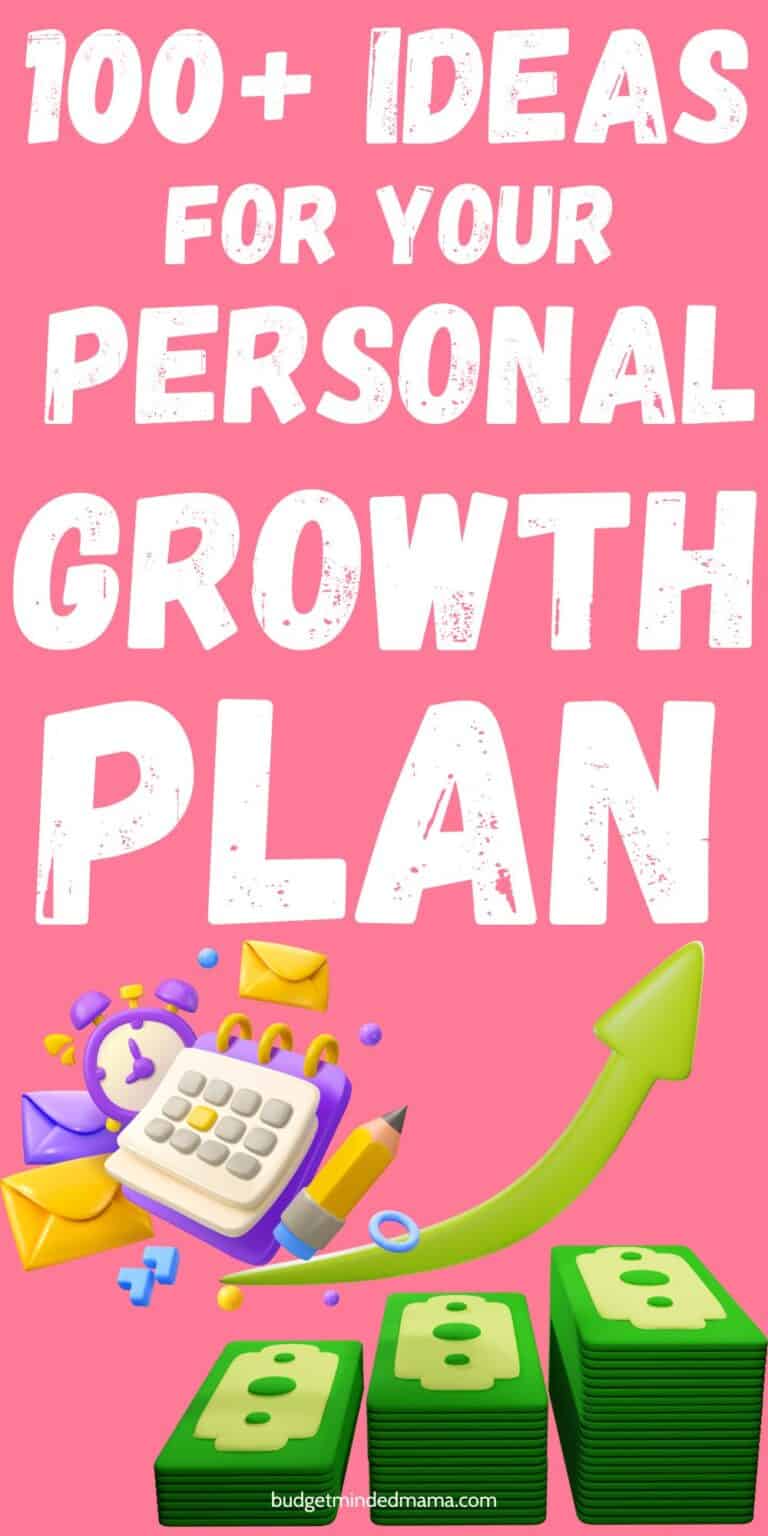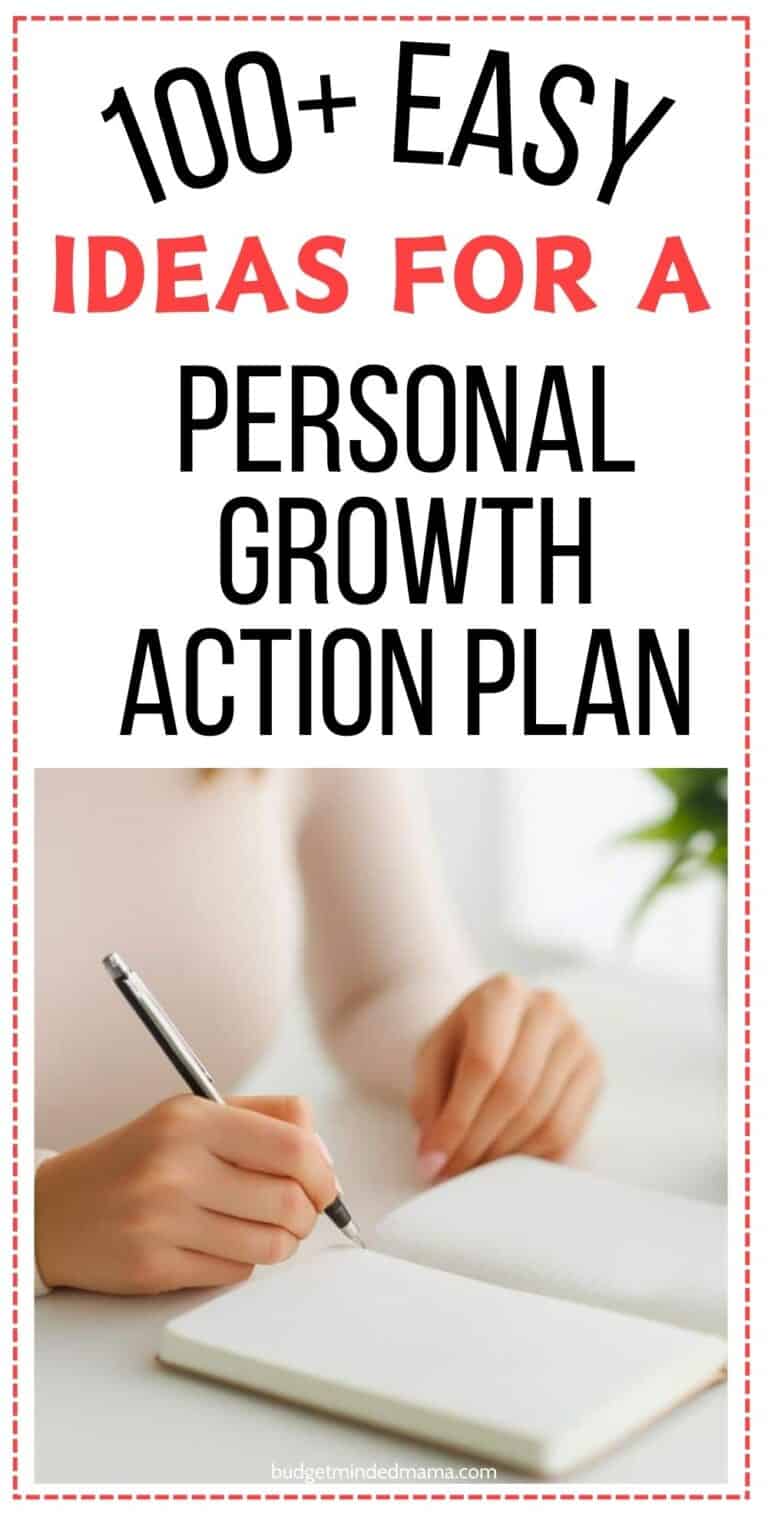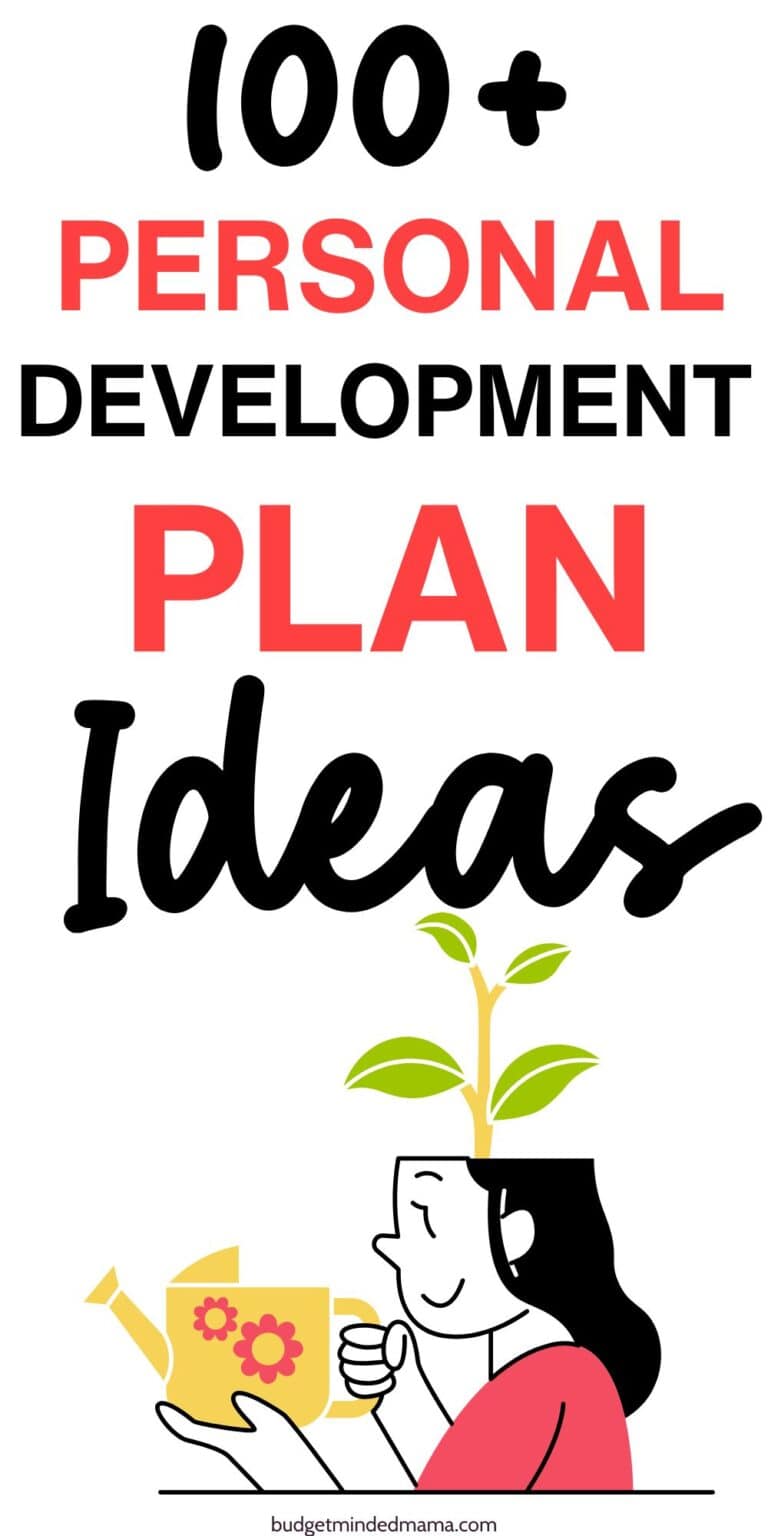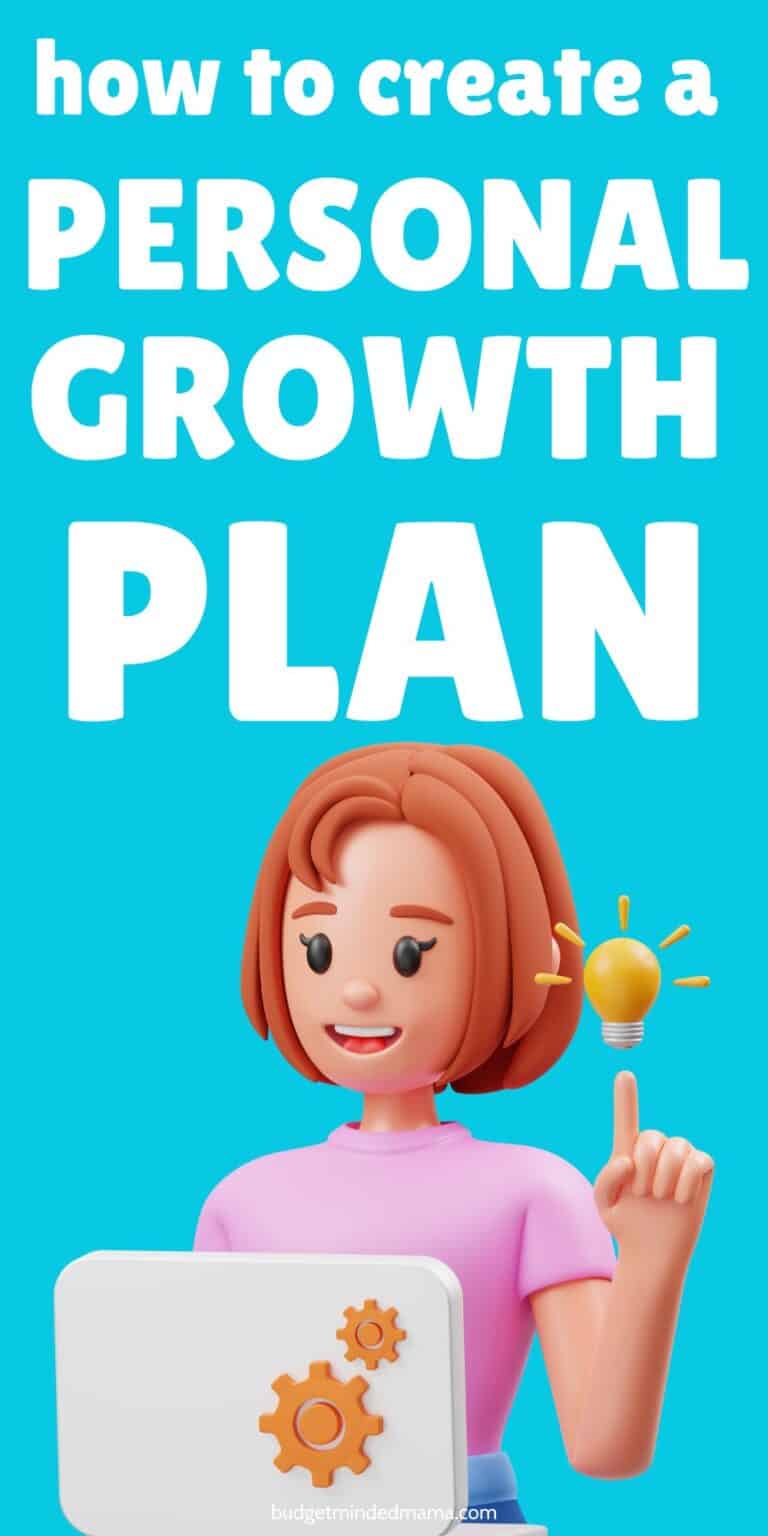Ready to make 2025 the year you finally thrive?

A personal growth plan is your roadmap to creating the life you’ve been dreaming about—one step at a time.
With a new year comes a fresh start, and there’s no better time to take a closer look at your goals, do a life audit, and focus on areas that matter most.
Think of this as more than just a “New Year, New You” cliché!
It’s about creating a vision for the life you want and breaking it down into manageable steps that work for you.
From crafting a 2025 vision board to setting meaningful goals for your career, relationships, and overall well-being, this is your chance to start fresh and make real progress.
Let’s map out a personal growth plan that fits your unique life, helps you stay motivated, and keeps you moving forward—all year long!
How to Create a Personal Development Plan

Creating a personal development plan for 2025 starts with reflection and focus.
Begin by identifying the areas you want to improve, such as finances, health, or creativity.
Use a life audit to assess where you are now and where you want to be.
Next, choose a few specific goals from each category and prioritize them—don’t try to tackle everything at once.
Break these goals into smaller, actionable steps and set realistic timelines to achieve them.
For example, if your goal is to build better habits, start with one small change, like a daily gratitude journal.
Finally, track your progress regularly!
Schedule weekly or monthly check-ins to celebrate wins, adjust your plan, and stay motivated.
By keeping it simple and focused, your personal development plan can guide you to make 2025 your best year yet, mama!
Financial Goals

Financial stability is a cornerstone of personal development.
By setting and achieving financial goals, you create a foundation that supports all other areas of your life.
Whether it’s saving, budgeting, or reducing debt, managing your money wisely reduces stress and allows you to focus on your growth.
1. Set a Financial Goal and Make a Monthly Budget
Setting clear financial goals helps you focus your efforts and track progress.
Start by identifying what matters most—whether it’s saving for a vacation, building an emergency fund, or paying down debt.
A monthly budget is your tool to make it happen, ensuring you know exactly where your money is going.
2. Plan a “No-Spend Month” to Boost Your Savings
A no-spend month can be a powerful reset for your finances.
Challenge yourself to spend only on essentials like groceries and bills while avoiding extras like takeout or impulse buys.
Use this time to reflect on your spending habits and funnel the savings into something meaningful, like a rainy day fund.
3. Track Your Spending and Find Ways to Save Money
Tracking your spending helps you see where your money actually goes versus where you think it goes.
Apps like Mint or YNAB can make it easy, or you can jot things down in a notebook.
Once you spot patterns, like frequent coffee runs or unused subscriptions, it’s easier to adjust and save more.
4. Build a Financial Safety Net This Year
A financial safety net offers peace of mind during unexpected situations.
Start by building an emergency fund with at least three to six months’ worth of essential expenses.
Add to it slowly, even if it’s just $20 a week—it all adds up and provides long-term security.
5. Take a Personal Finance Course
Learning the basics of personal finance can completely change how you manage money.
Online courses, many of which are free, can teach you about budgeting, saving, investing, and debt management.
Pick one that aligns with your goals and commit to applying what you learn step by step.
6. Set a Goal to Reduce Debt by Year’s End
Reducing debt frees up your finances and reduces stress.
Start with either the snowball method (paying off small debts first) or the avalanche method (tackling high-interest debt first).
Set a realistic goal, like paying off a specific credit card, and celebrate each milestone.
7. Learn Basic Investing Strategies
Investing can feel intimidating, but you don’t need to be a financial expert to get started.
Focus on understanding simple concepts like index funds, compound interest, and diversification.
Start small with an investment app, and let your money grow over time while you continue learning.
8. Create a Financial Vision Board
A financial vision board can help you visualize and stay motivated toward your money goals.
Include images, quotes, or numbers that represent your dreams, like a debt-free future or a dream home.
Place it somewhere visible to remind yourself why you’re working hard to save and invest.
9. Set Up a Financial Calendar for Tracking Expenses
A financial calendar keeps you organized by helping you track bills, savings goals, and deadlines.
Use it to mark due dates for payments, times to review your budget, or when to check your credit report.
Setting reminders ensures you stay on top of everything without surprises.
10. Learn to Negotiate for Better Financial and Career Outcomes
Negotiating isn’t just for salaries—it can apply to bills, rent, and even subscription services.
Do your research and confidently ask for discounts or better rates; companies often accommodate.
Practice your negotiation skills in smaller situations to build confidence for bigger asks.
Personal Development

Personal development is all about evaluating where you are and taking intentional steps to improve your life.
A life audit helps you identify what’s working, what’s not, and where you want to grow.
By setting clear goals, you can create a plan to achieve your dreams and live a more fulfilling life!
11. Set SMART Goals for 2025 and Stick to Them
SMART goals are specific, measurable, achievable, relevant, and time-bound, giving you a clear path to success.
For example, instead of saying, “I want to be healthier,” aim for, “I’ll exercise for 30 minutes, 4 times a week for 3 months.”
Write them down and revisit them regularly to stay on track.
12. Do a Life Audit: Assess Where You Are and Where You Want to Be
A life audit helps you identify what’s working, what’s not, and where you want to go.
Break it down into areas like career, relationships, finances, and personal growth, and honestly assess each.
Use this reflection to set actionable steps for improvement in 2025.
13. Develop a Personal Mission Statement
A personal mission statement acts as your north star, guiding your decisions and actions.
Take time to define your values, passions, and long-term goals, and write them down in a single, inspiring sentence.
Review it often to ensure your life aligns with what truly matters to you.
14. Identify Your Core Values and Align Your Goals
Knowing your core values—like family, health, or creativity—helps you make decisions that feel right.
Write down your top five values, then check if your goals align with them.
If they don’t, adjust your goals to reflect what truly matters.
15. Host a Personal Retreat for Reflection
Take a day or weekend to step away from daily distractions and focus on yourself.
Use the time to reflect on your goals, journal, and brainstorm solutions to any challenges.
A solo retreat doesn’t have to be fancy—a quiet space at home works perfectly.
16. Focus on Building a Growth Mindset
A growth mindset means believing you can improve through effort and learning.
Practice replacing limiting thoughts like “I can’t” with “I’m learning.”
Celebrate small wins and treat mistakes as opportunities to grow.
17. Write Down a List of Your Non-Negotiables for 2025
Your non-negotiables are the things you won’t compromise on, like prioritizing family time or maintaining your health.
Writing them down keeps them at the forefront of your decisions.
This clarity helps you say no to things that don’t serve your priorities.
18. Commit to Weekly Check-Ins with Your Growth Plan
Consistency is key to making progress on your goals.
Schedule a weekly time to review what you’ve accomplished, what needs adjusting, and what’s next.
Keep it short and focused so it feels like a helpful routine, not a chore.
19. Learn a New Skill Every Month
Adding a new skill each month keeps your personal growth exciting and well-rounded.
Start small—like learning a new recipe, photography tips, or a basic language phrase—and build up to more complex skills.
The variety keeps you motivated and curious!
20. Invest in a Personal Development Course
Online courses make personal growth accessible and tailored to your interests.
Whether it’s productivity, communication, or a creative hobby, choose a course that resonates with your goals.
Commit to completing it within a set timeframe to get the most out of your investment.
Health and Wellness

Good health is the backbone of personal development, enabling you to thrive in all areas.
Taking care of your body and mind boosts energy, focus, and resilience.
When you prioritize wellness, you’re better equipped to tackle challenges and pursue your goals.
21. Establish a Daily Meditation Practice
Meditation doesn’t have to take hours—a simple 5-10 minute practice can make a big difference.
Apps like Headspace or Calm can guide you, or you can sit quietly and focus on your breath.
Over time, you’ll notice improved focus, reduced stress, and a calmer mindset.
22. Develop a Sleep Schedule That Supports Your Goals
Good sleep is the foundation of productivity and well-being.
Aim for 7-9 hours of consistent sleep by setting a bedtime and wake-up routine. A
void screens before bed, and create a relaxing wind-down habit like reading or meditating.
23. Commit to Drinking More Water Every Day
Hydration plays a huge role in energy, focus, and overall health.
Set small, achievable goals, like drinking a glass of water when you wake up and before each meal.
Keep a reusable water bottle handy to remind yourself throughout the day.
24. Learn to Manage Stress Through Breathing Exercises
Breathing exercises are a quick and effective way to manage stress.
Try the 4-7-8 technique: inhale for 4 seconds, hold for 7 seconds, and exhale for 8 seconds.
Use it whenever you’re feeling overwhelmed to calm your body and mind.
25. Take Regular Walks to Clear Your Mind
Walking isn’t just exercise—it’s a chance to reset mentally.
Even a 10-minute stroll around your neighborhood can boost your mood and spark creativity.
Make it a daily habit, especially during work breaks or after stressful moments.
26. Focus on Reducing Anxiety Through Grounding Techniques
Grounding techniques help you stay present during moments of anxiety.
One popular method is the “5-4-3-2-1” technique: name five things you see, four you can touch, three you hear, two you smell, and one you taste.
Practice this to regain focus and calm.
27. Practice Mindful Eating for Better Health
Mindful eating means paying attention to your food and how it makes you feel.
Slow down, chew thoroughly, and savor each bite instead of eating on autopilot.
This helps with portion control and better digestion while making meals more enjoyable.
28. Create a Self-Care Routine That Works for You
Self-care doesn’t have to mean spa days—it’s about doing what recharges you.
Create a simple routine that includes things like reading, journaling, or even a quiet cup of tea.
Commit to it consistently to prevent burnout.
29. Set a Fitness Goal and Create a Workout Plan
A fitness goal gives you purpose and keeps you motivated.
Whether it’s running a 5K, doing yoga twice a week, or strength training, break it into achievable steps.
Track your progress and celebrate small victories along the way.
30. Build a Meal Prep Routine That Saves Time and Money
Meal prep can simplify your week and help you eat healthier.
Set aside a few hours on Sunday to chop veggies, cook proteins, and portion meals.
You’ll save money by avoiding takeout and make weeknight dinners stress-free.
Career and Productivity

Your career plays a major role in your personal growth journey.
Setting clear goals and improving your productivity not only helps you succeed professionally but also builds confidence and opens new opportunities.
By aligning your work with your values, you create a fulfilling and purpose-driven path.
31. Set Career Goals for the Year
Having clear career goals gives you a sense of purpose and direction.
Decide what you want to achieve—like a promotion, skill mastery, or a career change—and break it into smaller steps.
Write these goals down and revisit them monthly to track your progress.
32. Focus on Improving One Relationship in Your Career
Building stronger workplace relationships can open doors to collaboration and growth.
Choose a colleague, mentor, or manager to connect with more intentionally.
Regular check-ins, offering help, or simply sharing ideas can foster mutual respect and trust.
33. Learn to Create and Stick to a Realistic Daily Schedule
A well-structured daily schedule helps you stay productive without feeling overwhelmed.
Prioritize your tasks using time-blocking or the “must-do, should-do, could-do” method.
Don’t forget to include breaks, and leave room for flexibility to adjust as needed.
34. Master a New Software or Tool to Boost Productivity
Learning a new tool can make your work life smoother and more efficient.
Whether it’s project management software, graphic design apps, or automation tools, focus on one that aligns with your career.
Dedicate time to explore tutorials and practice regularly until it becomes second nature.
35. Develop a Digital Organization System
A clutter-free digital space saves time and reduces stress.
Organize files into clearly labeled folders, unsubscribe from unnecessary emails, and use tools like Trello or Notion for task management.
Review and tidy up your digital workspace weekly to maintain order.
36. Plan and Execute a Passion Project This Year
A passion project can reignite creativity and personal fulfillment.
Choose something you’ve always wanted to do, like writing a book, launching a small business, or starting a podcast.
Set a timeline and small milestones to make steady progress.
37. Start a Side Hustle to Boost Your Finances
A side hustle can be a fun way to earn extra income while pursuing your interests.
Think about your skills—like writing, design, or baking—and find a way to monetize them.
Start small and scale as you gain confidence and experience.
38. Attend Networking Events in Your Field
Networking isn’t just about business cards—it’s about building relationships.
Attend events, webinars, or industry meetups where you can learn and connect with others in your field.
Be genuine and curious, and follow up with new contacts to keep the connection alive.
39. Host Monthly Goal-Setting Sessions with Friends
Goal-setting is more fun (and motivating) when shared with others.
Gather a group of like-minded friends to set monthly goals and hold each other accountable.
Share wins, challenges, and tips to stay inspired and on track.
40. Join a Mastermind Group for Personal Growth
Mastermind groups bring together people with similar goals to share insights and advice.
Find or form a group where members can brainstorm, collaborate, and support each other’s progress.
It’s a great way to gain fresh perspectives and stay motivated.
Relationships

Strong relationships are vital for a happy, well-rounded life.
Conducting a life audit of your relationships helps you nurture connections that support your growth and let go of those that don’t.
When you invest time and energy into meaningful bonds, you create a network of encouragement and inspiration.
41. Reassess and Strengthen Key Relationships
Take time to evaluate the most important relationships in your life.
Are you giving and receiving the support you need?
Focus on meaningful connections by scheduling quality time, being present, and addressing unresolved issues.
42. Commit to Monthly Date Nights with Your Partner
Date nights are essential for maintaining connection and fun in your relationship.
Choose one night a month to focus solely on each other—no phones, no distractions.
Whether it’s a fancy dinner or a movie at home, the effort counts more than the activity.
43. Focus on Building Stronger Relationships with Friends
Friendships need nurturing just like any other relationship.
Reach out to old friends, plan regular meetups, or even just send a thoughtful text.
Strengthening these bonds adds joy and support to your life.
44. Practice Random Acts of Kindness Daily
Small acts of kindness can make a big impact on your day and someone else’s.
Compliment a coworker, leave a positive review for a business, or simply smile at a stranger.
Kindness creates a ripple effect, often coming back to you in unexpected ways.
45. Host a Vision Board Party with Friends
Creating vision boards together is both fun and inspiring.
Gather supplies like magazines, scissors, and glue, and encourage everyone to share their dreams.
It’s a great way to bond while motivating each other to chase your goals.
46. Volunteer in Your Community to Give Back
Volunteering not only helps others but also gives you a sense of purpose.
Choose a cause you’re passionate about—like animal shelters, food banks, or mentorship programs—and commit to regular involvement.
You’ll make a positive impact while meeting new people.
47. Join a Club or Group to Meet Like-Minded People
Clubs and groups are excellent for expanding your social circle while pursuing shared interests.
Look for book clubs, hobby groups, or sports teams in your area.
They provide a great opportunity to connect and grow through shared activities.
48. Set a Goal to Become a Better Listener
Active listening is a skill that can transform your relationships.
Practice focusing fully on the speaker, asking thoughtful questions, and resisting the urge to interrupt.
It shows you care and fosters deeper understanding.
49. Identify and Address Relationship Challenges
Every relationship faces challenges, but addressing them can strengthen the bond.
Take time to discuss issues openly and calmly, and focus on finding solutions together.
Honest communication is key to resolving conflicts and moving forward.
50. Reconnect with an Old Friend or Family Member
Life gets busy, and sometimes we lose touch with those who matter.
Reach out to someone you haven’t spoken to in a while with a simple message or call.
Reconnecting can reignite valuable relationships and remind you of shared memories.
Habits and Routines

Habits and routines are the building blocks of consistent progress in personal development.
Establishing daily rituals helps you stay focused and make the most of your time.
Small, intentional changes in your routine can lead to significant transformations over time.
51. Develop a Morning Routine for Productivity
A structured morning routine sets the tone for the rest of your day.
Start with small habits, like stretching, drinking water, or writing down three priorities.
Over time, you’ll notice a boost in focus and energy, making mornings something to look forward to.
52. Create a Consistent Evening Wind-Down Routine
An evening routine helps your body and mind transition from the busyness of the day to restful sleep.
Include calming activities like reading, meditating, or journaling to clear your head.
Avoid screens at least an hour before bed to improve sleep quality.
53. Experiment with a New Productivity Technique
Productivity techniques like the Pomodoro method or Eisenhower Matrix can help you work smarter, not harder.
Choose one to try for a week and see how it fits into your workflow.
Adjust as needed until you find what keeps you focused and efficient.
54. Create a Weekly Meal Plan for Better Health and Finances
Meal planning takes the guesswork out of mealtime and saves you money.
Dedicate one day to plan the week’s meals, write a grocery list, and prep ingredients.
Not only will you eat healthier, but you’ll also avoid last-minute takeout runs.
55. Focus on Improving Your Sleep Hygiene
Good sleep hygiene includes habits and a sleep environment that promote restful nights.
Keep your room dark and cool, stick to consistent sleep and wake times, and limit caffeine later in the day.
Prioritize sleep as part of your overall wellness plan.
56. Set a Daily Step Goal for Physical Health
Walking more each day is a simple way to boost your fitness.
Use a fitness tracker or app to set a realistic step goal, like 8,000 or 10,000 steps.
Incorporate walks into your routine by parking further away, taking the stairs, or scheduling quick walks during breaks.
57. Declutter and Organize Your Living Space
A tidy space makes for a tidy mind.
Start with one area, like your closet or desk, and sort items into keep, donate, and toss piles.
Decluttering regularly keeps your home functional and reduces stress.
58. Practice Saying No to Protect Your Time
Saying no can feel uncomfortable, but it’s essential for managing your time and energy.
Politely decline tasks, invitations, or commitments that don’t align with your priorities.
By doing so, you create space for what truly matters.
59. Commit to a Social Media Detox
Social media can be a time drain and impact your mental health if overused.
Take a break by deleting apps for a day, week, or month, and notice how it feels.
Use the extra time for activities that recharge you, like reading or connecting with loved ones.
60. Start a Gratitude Journal for Daily Reflection
Gratitude journaling shifts your focus to the positive moments in your life.
Each day, write down three things you’re thankful for—big or small.
Over time, this simple habit can improve your mood and overall outlook.
Creativity and Hobbies

Exploring creativity and hobbies is a powerful way to enhance personal development.
These activities allow you to recharge, express yourself, and discover new passions.
By dedicating time to creative pursuits, you add joy and balance to your life.
61. Learn a Creative Skill Like Painting or Writing
Tapping into your creativity can be incredibly fulfilling.
Choose a skill you’ve always been curious about and take an online class or workshop.
Regular practice not only hones your abilities but also provides a relaxing escape from daily stress.
62. Plan a Year of Adventure by Trying One New Experience Each Month
Adventure doesn’t have to mean skydiving—it’s about stepping out of your comfort zone.
Each month, try something new, like visiting a local museum, hiking a new trail, or learning to bake bread.
These small adventures can add excitement and variety to your year.
63. Start a Blog to Document Your Personal Growth Journey
A blog is a great way to reflect on your journey and share your experiences with others.
Choose a platform and start writing about your goals, progress, and lessons learned.
It’s a creative outlet that can also inspire and connect with like-minded people.
64. Reconnect with a Hobby You Used to Love
Think back to something you enjoyed but stopped doing—like painting, gardening, or playing an instrument.
Revisit that hobby with fresh eyes and set aside time each week to practice it.
Rediscovering what you love can bring unexpected joy.
65. Plan Quarterly Mini-Adventures to Recharge
Mini-adventures, like day trips or staycations, are perfect for breaking up your routine.
Plan one every three months to explore a new place or try an activity like paddleboarding or pottery.
These moments refresh your spirit and give you stories to remember.
66. Create a Vision Board Specific to Personal Relationships
A vision board for relationships focuses on how you want to connect with others.
Include images and quotes that represent qualities like kindness, trust, and fun.
Use it as a reminder to nurture these connections in meaningful ways.
67. Build a Reading List of Biographies for Inspiration
Biographies offer a glimpse into the lives of inspiring individuals and their challenges.
Curate a list of people you admire—entrepreneurs, artists, activists—and read their stories.
You’ll gain valuable lessons and fresh motivation for your own journey.
68. Take a Photography Class to Capture Memories
Learning photography teaches you to see the world differently and preserve special moments.
Sign up for an online course or find tutorials to get started with your camera or smartphone.
Practice capturing everyday scenes to build your skills and confidence.
69. Commit to Daily Acts of Kindness for a Month
A month of daily kindness can transform your outlook and the lives of those around you.
Start with simple gestures like complimenting someone, holding the door, or writing a thank-you note.
These small efforts create a ripple effect of positivity.
70. Plan a Solo Retreat for Deeper Reflection
A solo retreat is your chance to pause, reflect, and recharge.
Choose a peaceful setting—whether it’s your home, a quiet cabin, or a favorite park—and dedicate time to journaling, meditating, or simply thinking.
This space allows you to connect with your thoughts and reset your focus.
Mindset and Reflection

Your mindset shapes how you approach challenges and opportunities.
Regular reflection allows you to assess your progress and realign with your goals.
Developing a growth mindset and taking time for self-awareness are essential for long-term personal growth.
71. Write a Letter to Your Future Self
Writing to your future self is a powerful way to reflect on your goals and values.
Share your current dreams, challenges, and what you hope to achieve in a year.
When you read it later, it’s a great way to see how far you’ve come and realign with your priorities.
72. Focus on Emotional Regulation Skills
Learning to regulate your emotions helps you respond thoughtfully instead of reacting impulsively.
Practice techniques like deep breathing, pausing before responding, and identifying triggers.
Over time, you’ll feel more in control and better equipped to handle challenges.
73. Practice Daily Affirmations for Confidence
Positive affirmations can reshape how you think about yourself.
Each morning, say or write statements like, “I am capable,” or “I deserve happiness.”
These affirmations help you build confidence and foster a growth-oriented mindset.
74. Write Down Your Biggest Lessons from 2024
Reflecting on the past year helps you grow and avoid repeating mistakes.
Write down what went well, what didn’t, and the lessons you learned.
Use this insight to shape better decisions and actions in 2025.
75. Reflect on Your Progress with a Weekly Journal
A weekly journal is a simple way to track your growth and adjust your approach.
Spend 10-15 minutes writing about your wins, challenges, and plans for the next week.
It keeps you focused and motivated while offering a space for self-reflection.
76. Create a List of Bad Habits to Break
Identifying habits that hold you back is the first step to letting them go.
Write down the habits you want to change, like procrastination or overspending, and think about their triggers.
Replace each bad habit with a positive one, and track your progress.
77. Commit to Journaling About Your Fears and How to Overcome Them
Journaling about fears can help you understand and conquer them.
Write down what scares you, why it affects you, and steps you can take to move past it.
This practice makes your fears feel less overwhelming and gives you a plan to face them.
78. Focus on Being Present Through Mindfulness
Mindfulness means fully engaging in the moment instead of worrying about the past or future.
Practice it by focusing on your senses during everyday activities, like eating or walking.
This habit reduces stress and increases your appreciation for the little things.
79. Practice Forgiveness to Let Go of Grudges
Forgiving doesn’t mean excusing hurtful behavior—it means releasing the emotional weight it carries.
Write down what you’re holding onto and how it impacts you.
Forgiving others (and yourself) frees you to move forward with a lighter heart.
80. Identify Your Stress Triggers and Address Them
Knowing what causes your stress is the first step to managing it.
Pay attention to moments when you feel overwhelmed and identify common patterns, like deadlines or social pressure.
Develop strategies to tackle these triggers, such as prioritizing tasks or setting boundaries.
Learning and Growth

Continuous learning expands your horizons and keeps your mind sharp.
Whether it’s picking up a new skill or diving deeper into a subject you love, growth through learning fuels your personal development.
The more you grow, the more confident and capable you become.
81. Take an Online Course to Build a New Skill
Online courses make learning accessible and flexible.
Choose a course that aligns with your goals, like improving communication, mastering a new hobby, or advancing your career.
Dedicate time each week to complete lessons and apply what you learn.
82. Learn a Language to Expand Your Horizons
Learning a new language opens doors to new cultures and connections.
Apps like Duolingo or Babbel make it fun and manageable in small daily lessons.
Practice consistently and set mini-goals, like learning 50 new words or having a basic conversation.
83. Read 12 Personal Development Books in 2025
Commit to reading one personal development book a month to expand your knowledge and skills.
Choose topics that excite you, like mindset, productivity, or relationships.
Take notes as you read and apply key takeaways to your daily life.
84. Build a Reading List of Biographies for Inspiration
Biographies provide valuable insights into the lives of people who’ve overcome challenges and achieved greatness.
Choose people who inspire you and explore their stories.
These books often reveal relatable struggles and teach resilience.
85. Practice Visualization Exercises to Boost Motivation
Visualization is a mental rehearsal for success.
Spend a few minutes each day imagining yourself achieving a specific goal, like acing an interview or running a marathon.
Focus on the details—how it feels, what you see, and the steps you take.
86. Learn Basic Home Maintenance Skills
Learning simple home maintenance skills saves money and builds independence.
Watch some YouTube videos or take a workshop to learn tasks like fixing a leaky faucet or patching drywall.
These practical skills come in handy and boost your confidence in handling challenges.
87. Focus on Improving Your Writing Skills
Writing is a valuable skill for communication, creativity, and career growth.
Practice regularly by journaling, blogging, or even writing letters to friends.
Take feedback as an opportunity to grow and experiment with different styles.
88. Set a Goal to Improve Your Public Speaking Skills
Public speaking can boost your confidence and career opportunities.
Start by practicing in low-pressure settings, like family gatherings or small group meetings.
Joining organizations like Toastmasters can also provide guidance and support.
89. Study the Habits of Successful People
Successful people often share common habits like time management, goal setting, and self-discipline.
Read books, watch interviews, or listen to podcasts to learn their strategies.
Incorporate one or two habits into your routine to see how they work for you.
90. Commit to Watching Motivational TED Talks Weekly
TED Talks are a treasure trove of inspiring and educational content.
Set aside time each week to watch a talk that aligns with your interests or challenges.
Reflect on the key message and think about how you can apply it in your life.
Fun and Exploration

Fun and exploration are often overlooked aspects of personal development.
Trying new experiences and stepping out of your comfort zone broadens your perspective and sparks creativity.
By balancing growth with enjoyment, you create a fulfilling and exciting life.
91. Create a Yearly Bucket List
A bucket list keeps your year exciting and full of purpose.
Write down experiences you’ve always wanted to try, like visiting a national park, learning a dance style, or volunteering abroad.
Check off items as you go to make 2025 unforgettable.
92. Set a Monthly Goal to Try Something New
Trying something new each month keeps your routine fresh and fulfilling.
Choose activities like attending a cooking class, exploring a new hiking trail, or testing a different hobby.
These experiences add variety and spark joy throughout the year.
93. Plan Your Dream Vacation for Motivation
Even if it’s far in the future, planning your dream vacation can keep you inspired.
Research destinations, activities, and budgets to create a realistic plan.
Use it as motivation to save money or work toward other goals.
94. Explore Minimalism and Declutter Your Life
Minimalism isn’t about owning nothing—it’s about making space for what truly matters.
Start by decluttering one area, like your wardrobe or digital files, and build from there.
Focus on keeping items that serve a purpose or bring joy.
95. Join a Book Club Focused on Personal Development
Book clubs combine learning and socializing in one activity.
Find or start a club that focuses on personal growth topics, like leadership or wellness.
Sharing insights with others enhances your understanding and accountability.
96. Start a 2025 Memory Jar to Record Your Highlights
A memory jar is a simple way to celebrate life’s little wins and big moments.
Write down special memories on slips of paper throughout the year and place them in a jar.
At the end of 2025, you’ll have a treasure trove of positive experiences to look back on.
97. Commit to Watching Documentaries on Topics That Interest You
Documentaries are an engaging way to learn about new subjects or deepen your understanding of current interests.
Pick one or two topics to focus on, like climate change, history, or personal finance.
Schedule a documentary night and take notes for future action.
98. Set Up a Monthly “Fun Day” for Exploration
Dedicate one day a month to exploring something new or exciting.
Visit a nearby town, try a unique activity, or simply spend the day doing something out of your routine.
These fun days recharge your energy and keep life exciting.
99. Focus on Exploring Your City Like a Tourist
Sometimes the best adventures are close to home.
Research hidden gems, attractions, or events in your city that you’ve never explored.
Treat it as a mini-vacation and discover a fresh perspective on your hometown.
100. Start a Small Garden for Fresh Produce
Gardening is a rewarding hobby that connects you to nature and provides fresh food.
Start small with herbs, tomatoes, or leafy greens in pots or a backyard space.
Caring for your garden is therapeutic and helps you appreciate the fruits (or veggies) of your labor.
Sustainability and Giving Back

Caring for the planet and giving back to others is a meaningful part of personal growth.
These actions foster a sense of purpose and connection to the world around you.
By contributing to something bigger than yourself, you create positive ripples that benefit both you and your community.
101. Focus on Reducing Waste and Living Sustainably
Small changes, like using reusable bags, composting, or buying secondhand, can make a big difference.
Take a look at your habits and look for areas where you can reduce waste.
Living sustainably benefits the planet and often saves you money.
102. Practice Mindful Consumption in Daily Life
Mindful consumption means being intentional about what you buy and why.
Before making a purchase, ask yourself if it adds value or serves a need.
This practice reduces impulse buying and helps you appreciate what you already have.
103. Commit to Monthly Giving Goals to Help Others
Giving back doesn’t have to be huge—it just has to be consistent.
Set a goal to donate time, money, or resources to a cause you care about each month.
Even small contributions can have a meaningful impact on your community.
104. Volunteer for a Cause You’re Passionate About
Volunteering connects you with like-minded people while making a difference.
Choose a cause that resonates with you, like tutoring kids, cleaning up parks, or helping at an animal shelter.
Regular involvement enriches your life and the lives of others.
105. Plan a Year of Giving Through Small, Consistent Efforts
Instead of one big gesture, aim to give in small, steady ways throughout the year.
Write letters of encouragement, pay for a stranger’s coffee, or support local businesses.
These acts of kindness create positive ripples and make the world a bit brighter.
Embracing Growth in Every Area of Life
Personal development isn’t about perfection—it’s about progress.
By focusing on these key areas, you can create a balanced, fulfilling life that aligns with your goals and values.
Embrace the journey, celebrate your growth, and remember that every small action contributes to a brighter, more meaningful future!
For more financial help, follow me on Pinterest!



